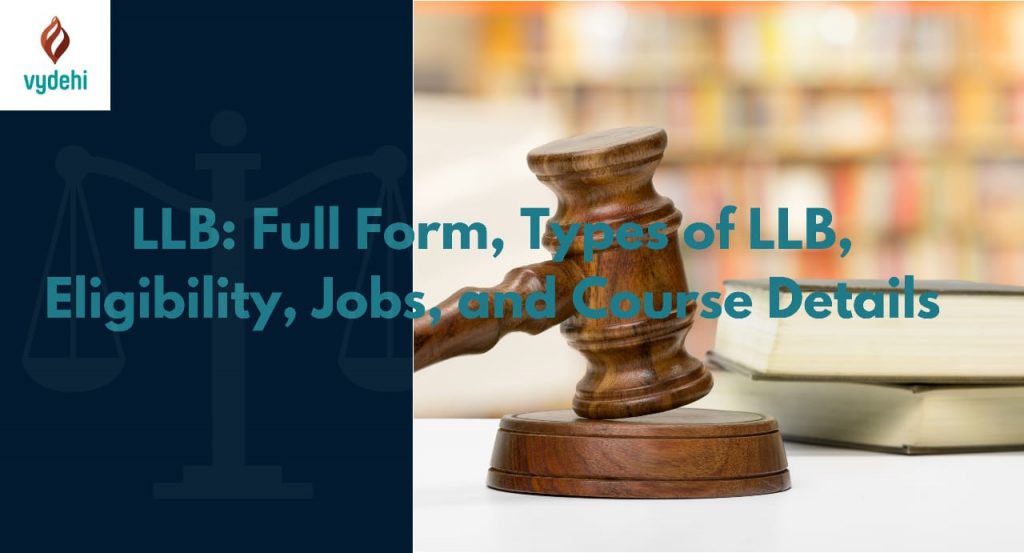LLB Course Details: Types, Eligibility, Admission & Jobs
Are you considering a career in law but unsure where to begin? If you’re an aspiring law student or a parent looking for the best options for your child, understanding the intricacies of LLB courses is essential. Learn more about the LLB course details after the 12th including the full form of LLB, types of courses, eligibility criteria, admission process and career opportunities.
What is LLB? Full Form and Meaning
The full form of LLB is Legum Baccalaureus, which is Latin for Bachelor of Laws. In simpler words, an LLB is an undergraduate or postgraduate law degree that provides students with the knowledge of legal principles, legal systems and analytical thinking.
An LLB degree is the first step for anyone aiming to become a lawyer, judge, or legal consultant. It provides a deep understanding of the legal framework and sharpens critical thinking, communication, and problem-solving skills.

Types of LLB Courses
There are different types of LLB courses in India tailored to cater to diverse educational backgrounds and career aspirations. Here are the major types:
1. Integrated LLB Courses
Integrated LLB programs are 5-year courses that combine undergraduate studies with legal education. They are ideal for students who have completed their 12th grade. Popular types of integrated LLB courses include:
- B.A. LL.B: Combines humanities and law subjects.
- B.Com. LL.B: Integrates commerce and law.
- B.Sc. LL.B: Designed for students with a science background.
- BBA. LL.B: Blends business administration with legal studies.
2. Traditional LLB (3-Year Course)
This is a 3-year law course for students who have already completed a bachelor’s degree in any discipline. The focus is purely on legal studies, making it a concentrated program for graduates.
3. LLM (Master of Laws)
An LLM is a postgraduate degree that allows students to specialize in areas like corporate law, intellectual property law, or international law. It is ideal for those looking to advance their legal expertise.
Eligibility Criteria for LLB Courses
Eligibility requirements for LLB programs differ depending on the type of course:
1. For Integrated LLB Courses (5 Years):
- Educational Qualification: Completion of 10+2 from a recognized board.
- Minimum Marks: 45%-50% (varies by institution and category).
- Age Limit: No age restriction (as per Bar Council of India guidelines).
2. For Traditional LLB Courses (3 Years):
- Educational Qualification: Graduation in any discipline from a recognized university.
- Minimum Marks: 45%-50% (depending on the institution).
3. For LLM (2 Years):
- Educational Qualification: Completion of LLB or an equivalent law degree.
- Minimum Marks: 50%-55% in LLB.
LLB Admission Process
The LLB admission process typically involves entrance exams, followed by counseling or direct admissions. Here’s how it works:
1. Entrance Exams:
Some of the most popular law entrance exams in India include:
- CLAT (Common Law Admission Test): For admission to NLUs and other prestigious law colleges offering integrated LLB courses.
- AILET (All India Law Entrance Test): Conducted by National Law University, Delhi.
- LSAT (Law School Admission Test): Accepted by several private law universities.
- DU LLB Entrance Exam: For admission to the 3-year LLB program at Delhi University.
2. Application and Counselling:
After clearing the entrance exam, candidates can apply to their preferred law colleges, attend counselling sessions, and secure admission.
3. Direct Admission:
Some universities and private institutions offer direct admission based on merit or management quota.
LLB Course Details
Understanding the curriculum and structure of LLB courses is crucial for aspiring law students.
Subjects Covered in LLB Courses
- Core Subjects: Constitutional Law, Criminal Law, Contract Law, Civil Law, Property Law.
- Specialized Areas: Corporate Law, Environmental Law, Intellectual Property Rights.
- Skill Development: Moot court sessions, internships, and legal writing.
Duration of the Courses
- Integrated LLB: 5 years.
- Traditional LLB: 3 years.
Assessment Methods
- Semester-based exams.
- Practical assignments, case studies, and moot court activities.
Career Opportunities After LLB
A law degree offers immense career potential. Here’s an overview of some popular jobs after LLB:
1. Lawyer/Advocate:
Represent clients in legal matters, from civil disputes to criminal cases.
2. Corporate Legal Advisor:
Work with companies to ensure compliance with laws and regulations.
3. Judge:
After clearing judicial services exams, LLB graduates can become judges.
4. Legal Consultant:
Offer expert advice on legal matters to businesses, government agencies, or individuals.
5. Academia and Research:
Teach law in universities or engage in legal research.
6. Legal Journalist:
Report on legal developments and cases for media outlets.
7. Civil Services:
Many LLB graduates opt for administrative roles through exams like UPSC.
Why Pursue an LLB Course?
- Versatility: The knowledge gained in law can be applied in numerous fields, from politics to business.
- Prestige: The legal profession is highly respected and offers societal influence.
- Skill Development: Students acquire communication, negotiation, and analytical skills.
- Financial Stability: A career in law often comes with stable and rewarding pay.
LLB Course Details After 12th: Key Takeaways
If you’re a student fresh out of school, an integrated LLB course can be your gateway to the legal world. Choose a specialization that aligns with your interests—be it corporate law, criminal law, or even intellectual property rights.
For graduates, a 3-year LLB program is an excellent option to transition into the legal profession.
Conclusion
The world of law is vast, rewarding, and intellectually stimulating. Whether you’re an aspiring lawyer or a parent helping your child choose a career path, understanding the LLB full form, types of LLB courses, and the LLB admission process is critical. By enrolling in a well-structured LLB course, students can pave their way toward a prestigious career in law.
Explore your options, choose a course that fits your goals, and unlock the countless opportunities a career in law can bring!
